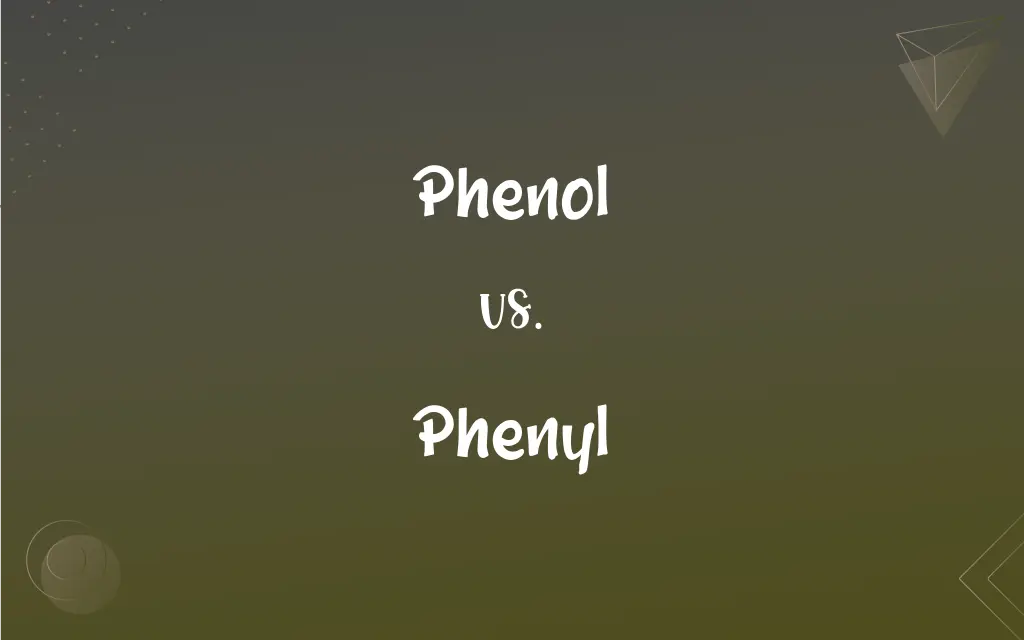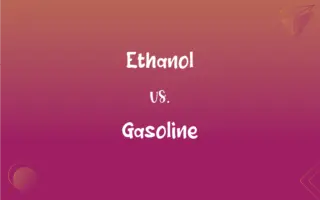Phenol vs. Phenyl: What's the Difference?
Edited by Aimie Carlson || By Harlon Moss || Updated on October 24, 2023
Phenol is a hydroxyl compound, C₆H₅OH; phenyl is a hydrocarbon group, C₆H₅-.

Key Differences
Phenol and phenyl are both related to benzene, a fundamental structure in organic chemistry, but they serve distinct roles. Phenol refers to a specific compound, which consists of a benzene ring attached to a hydroxyl (-OH) group. This hydroxyl group imparts unique chemical properties to phenol, making it distinct from benzene itself. On the other hand, phenyl is a hydrocarbon group derived from benzene by removing one hydrogen atom, represented as C₆H₅-.
Delving into their applications, phenol is used extensively in the chemical industry. It's a precursor to many compounds and is also employed in the production of resins, dyes, and explosives. Phenyl, being a functional group, doesn't have standalone applications. However, it's a fundamental component in numerous organic compounds, signifying the presence of a benzene ring without the hydroxyl group.
From a reactivity perspective, phenol exhibits properties of both alcohols and aromatic compounds. Due to the aromatic ring's presence, phenol can undergo electrophilic aromatic substitution reactions. Phenyl, in contrast, can be found in molecules where the benzene ring can participate in reactions, but it doesn't have the reactivity associated with the -OH group.
A significant point of confusion might stem from their naming similarity. Phenol indicates a specific molecule with a definite structure. Phenyl, conversely, is a part or fragment of a molecule and doesn't exist independently but is always attached to something else.
Comparison Chart
Nature
Specific compound
Hydrocarbon group
ADVERTISEMENT
Chemical Formula
C₆H₅OH
C₆H₅-
Reactivity
Aromatic and alcohol properties
Aromatic property without -OH
Applications
Resins, dyes, explosives
Component in various organic compounds
Existence
Exists independently
Exists as part of another molecule
Phenol and Phenyl Definitions
Phenol
Precursor in organic synthesis.
Many plastics are derived from phenol.
ADVERTISEMENT
Phenyl
A benzene ring minus a hydrogen atom.
Phenylalanine contains a phenyl group.
Phenol
Aromatic compound with a hydroxyl group.
Phenol can be obtained from coal tar.
Phenyl
Hydrocarbon group derived from benzene.
The molecule had a phenyl attachment.
Phenol
A hydroxylated benzene compound.
Phenol is used in the manufacture of Bakelite.
Phenyl
A substituent with a C₆H₅ structure.
Benzene, when attached to another compound, becomes a phenyl group.
Phenol
Base molecule for various derivatives.
Salicylic acid is a derivative of phenol.
Phenyl
Represents benzene's presence in compounds.
Phenyl groups are abundant in many organic chemicals.
Phenol
A white crystalline substance.
Pure phenol has a distinct odor.
Phenyl
Fragment of a molecule indicating a benzene derivative.
The presence of a phenyl ring altered the molecule's reactivity.
Phenol
A caustic, poisonous, white crystalline compound, C6H6O, derived from benzene and used in resins, plastics, and pharmaceuticals and in dilute form as a disinfectant. Also called carbolic acid.
Phenyl
An aromatic hydrocarbon unit, C6H5, that can occur as a substituent in an organic compound or as an ion or radical, structurally related to benzene.
Phenyl
(organic chemistry) A univalent hydrocarbon radical (C6H5) formally derived from benzene by the removal of a hydrogen atom, and the basis of an immense number of aromatic derivatives.
Phenyl
A hydrocarbon radical (C6H5) regarded as the essential residue of benzene, and the basis of an immense number of aromatic derivatives.
FAQs
What's the main source of industrial phenol?
Phenol is majorly derived from petrochemicals through the cumene process.
What represents a phenyl group?
Phenyl is a hydrocarbon group denoted as C₆H₅-.
Can phenol exist independently?
Yes, phenol is a specific compound that can exist on its own.
Can phenyl groups be added to other compounds?
Yes, phenyl groups can be introduced into molecules through various reactions.
Is a phenyl group aromatic?
Yes, a phenyl group retains the aromatic character of benzene.
Are phenol and phenyl interchangeable terms?
No, they refer to different chemical entities.
Does phenyl have a distinct odor?
The phenyl group itself doesn't, but compounds containing it may have characteristic odors.
Are there derivatives of phenol?
Yes, many compounds are derived from phenol, like salicylic acid.
Is phenyl a standalone molecule?
No, phenyl is always part of another molecule.
What makes phenol unique chemically?
The hydroxyl group in phenol imparts distinct chemical properties.
In what compounds is the phenyl group commonly found?
Phenyl is found in many organic compounds, signifying a benzene derivative.
Why is phenol used in disinfectants?
Phenol has antiseptic properties, making it valuable in disinfectants.
How does the reactivity of phenol differ from alcohols?
Phenol's reactivity is influenced by both its aromatic ring and hydroxyl group.
What is phenol?
Phenol is a hydroxyl compound with the formula C₆H₅OH.
Can phenyl groups be hydrogenated?
Yes, they can be, leading to cyclohexyl groups.
What's the significance of the phenyl group in organic chemistry?
Phenyl indicates the presence of a benzene ring in a compound.
Is phenyl a functional group?
Yes, phenyl is a functional group indicating a benzene derivative in a molecule.
What's the physical state of phenol at room temperature?
Phenol is a solid, forming white crystals at room temperature.
Is phenol toxic?
Yes, phenol can be toxic and needs careful handling.
Can phenol undergo electrophilic substitution?
Yes, due to its aromatic nature, phenol can undergo such reactions.
About Author
Written by
Harlon MossHarlon is a seasoned quality moderator and accomplished content writer for Difference Wiki. An alumnus of the prestigious University of California, he earned his degree in Computer Science. Leveraging his academic background, Harlon brings a meticulous and informed perspective to his work, ensuring content accuracy and excellence.
Edited by
Aimie CarlsonAimie Carlson, holding a master's degree in English literature, is a fervent English language enthusiast. She lends her writing talents to Difference Wiki, a prominent website that specializes in comparisons, offering readers insightful analyses that both captivate and inform.
































































